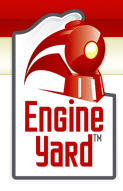 Engine Yard, a provider of support for the hot programming language and application framework, Ruby on Rails, has raised $3.5 million in a first round of capital from Benchmark Capital.
Engine Yard, a provider of support for the hot programming language and application framework, Ruby on Rails, has raised $3.5 million in a first round of capital from Benchmark Capital.
Ruby on Rails (or Rails, for short) has grown tremendously popular over the past two years, thanks to its light and agile nature. Leading companies of the latest Internet boom, including Twitter, have developed their applications using the framework. It is open source and therefore flexible — and is conducive to speedy development.
However, many of the fast-growing Rails-based companies have experienced choppy site performance. Twitter, for example, is notorious for its down-time. Some have criticized Ruby on Rails as being the problem, but the experts say it isn’t Rails per se, but rather the lack of precaution and readiness to handle its vulnerabilities. In other words, support is key.
That’s where Engine Yard comes in. Engine Yard, together with group of competitors, support Rails companies by hosting their applications and giving them round-the-clock support, such a monitoring, application revision control, and a computer cluster architecture designed to maximize web server and database efficiency (see Engine Yard’s basic offerings here, or techie details here). The sector is nascent. Engine Yard launched in late 2006. Other competitors include Joyent, a slightly older player (which won Twitter’s business, beating out Engine Yard), Rails Machine and many others. Engine Yard’s customers include Idealab and Kongregate.
Benchmark approached Engine Yard after Benchmark kept getting pitched by entrepreneurs using Rails to build their web applications, said partner Mitch Lasky, who is joining the company’s board. “Rail kept coming up and up,” he said.
Benchmark partner Peter Fenton will join him on the board.
Engine Yard’s chief executive Lance Walley said his team had planned to grow with out venture capital and was surprised a venture firm would want to invest. As chiefly a support company, Engine Yard on its surface didn’t offer the sort of breakthrough technology that can scale into a billion dollar company of the sort venture firms like to back.
However, the two sides discussed how a capital infusion could help Engine Yard work on some key open source projects that can help Rails perform better, including Rubinius (a more robust and speedier version of Ruby) and Merb (an adjunct of Rails). This work, in turn, might transform the company into becoming a software business, said Walley, one that can help it scale much more quickly.
Engine Yard hired Evan Phoenix, the leading developer of the Rubinius project, and has brought on four other key Rubinius contributors to work under him.
Engine Yard’s Walley said he took Benchmark’s money because the firm is considered the best in the open source arena. Engine Yard represents the firm’s eighth open source investment. Its companies include Zimbra, Red Hat, MySQL, Collabnet, SpringSource, Hyperic and Terracotta. Peter Fenton, now a partner at Benchmark, invested in JBoss and XenSource while was at Accel.
The company started in Sacramento, but has just moved to San Francisco’s South of Market area (SOMA) where many of the Rails companies are based (Engine Yard is ten doors down from Twitter now; watch out Joyent!)
The company is already profitable. It has a $3 million in annual revenue run rate, but that’s growing quickly, Walley said.

